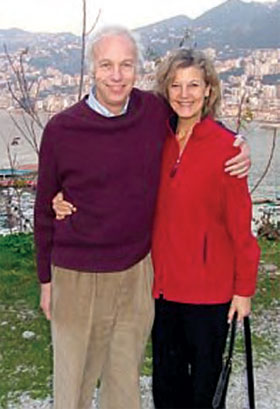It's usually a request—from the United Nations, a government agency, or a local group—that prompts SFCG to a launch a new program. But sometimes it is an organic process in which one outreach effort reveals another need. For instance, Sierra Leone refugees who were working in SFCG's radio studio in Liberia convinced the organization that a similar program was needed in their native country. Marks likes to quote Napoleon Bonaparte: On s'engage, et puis on voit. You engage, and then you see. Conflicts evolve and areas of need emerge, so flexibility is paramount. For instance, SFCG first went into Burundi nearly two decades ago in an attempt to prevent the kind of genocide that shattered neighboring Rwanda. But for the past several years, its Burundi programs have focused on conflicts over land reform. "We don't rush into things; we think them through," says Marks, who estimates that he spends about one-third of his time traveling the globe. "But the best ideas come out of the work we're already doing and not the original plans."
Starting a new program involves determining if the organization can meet the needs outlined in an assessment mission and securing funding to sustain operations. About 25 percent of SFCG's support comes from foundations, corporations, and individuals. The organization's largest donor is the European Union, followed by the governments of the U.S., Britain, and Norway. (Marks describes the latter as "the most imaginative, most willing to take chances.")

Search for Common Ground uses an integrated approach to promote societal healing— from both the top down (shuttle diplomacy, mediation, back-channel negotiations) and the bottom up (peace festivals, mobile cinemas, town hall meetings). The organization also focuses on news coverage of conflict, as Marks believes that inflammatory reporting subverts the transformational process. Toward that end, SFCG holds workshops to train journalists in avoiding stereotypes and weaning themselves off the if-it-bleeds-it-leads mentality. "How you frame the issue is important," he says. "Most journalists never ask, ‘Where do you agree with the other side?' It's always, ‘Where do you disagree?'" The organization has even formed the Common Ground News Service, which commissions and distributes "constructive" articles about Muslim-Western issues (in six languages) that have been reprinted more than 30,000 times in some 3,000 outlets.
Although SFCG encourages moderate voices, the organization can't always avoid the dangers inherent in seeking out conflict-torn territory. Last year in Côte d'Ivoire, post-election violence touched many local staff members. They had close relatives killed, houses burned, cars stolen; the Abidjan office was sacked twice. SFCG had been working for seven years to reduce violence in the country, and setbacks and frustration are an inevitable part of the process. As the organization has often done in the Middle East, it regrouped in Côte d'Ivoire, re-equipping its office and expanding production of its country-wide radio programs. "The metaphor I like is the toy truck that bounces off furniture," says Marks. "You just keep going."
So Search for Common Ground continues on—reintegrating ex-militants in Nigeria, training prison officials in Indonesia, establishing Radio Partnership for Peace in Pakistan, producing a TV series about the justice system in Kosovo, creating nationwide dispute resolution programs in Lebanon. Marks calls it the Woody Allen approach to conflict transformation; 80 percent of success is showing up. Recent evidence of this: the release last September of two American hikers who'd been imprisoned in Iran for more than two years. SFCG, which has been involved in conflict resolution with Iran since the mid-Nineties, had facilitated a series of highlevel dialogues between unofficial representatives of the two nations. They culminated in a trip to the Middle East by two high-ranking clergymen from Washington, D.C., who met with President Mahmoud Ahmadinejad, leading to the hikers' release. "The reason we were able to do what we did to get the hikers freed," says Marks, "is because we had been showing up for fifteen years."


